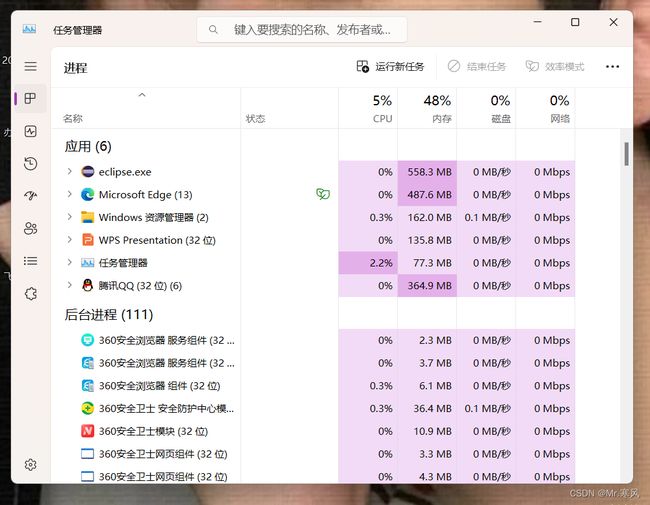importjava.util.Random;publicclassBirthdayParadox{publicstaticvoidmain(String[]args){intn=23;//邀请的人数inttrials=1000000;//实验次数intcount=0;//至少有两个人生日相同的实验次数Randomrand=newRandom();for(inti=0;i
JVM 类加载 详解
飞滕人生TYF
javajvmjava类加载
JVM类加载详解JVM类加载(JavaClassLoading)是Java虚拟机(JVM)执行Java程序的重要机制之一,用于将.class文件动态加载到内存中并进行验证、解析和初始化,最终生成可以直接使用的类对象。1.类加载的基本概念1.1什么是类加载?类加载是将.class文件加载到JVM并转化为内存中可以运行的类的过程。目标:生成一个内存中的Class对象,供程序使用。触发点:当程序首次访问
PakePlus:Vue 和 React 跨平台桌面应用程序的新纪元
大富大贵7
程序员知识储备1程序员知识储备2程序员知识储备3前端react.jsjavascript架构vue.js
摘要随着Vue和React等JavaScript框架的兴起,构建Web应用程序变得越来越高效和模块化。然而,将这些应用程序部署到桌面环境中一直是一个具有挑战性的问题,通常需要专门的工具和复杂的配置。PakePlus作为一个变革性的解决方案,弥合了Web开发和桌面应用程序部署之间的鸿沟。本文探讨了PakePlus如何简化将Vue和React项目打包为跨平台桌面应用程序的过程,推动了现代软件开发的边界
微信小程序和uni-app的区别
cccv工程师
微信小程序uni-appnotepad++
开发语言和框架:Uni-app:Uni-app使用Vue.js框架进行开发,利用Vue的语法和生命周期函数,开发者可以使用熟悉的前端技术栈。微信小程序:微信小程序使用自己的框架,基于WXML(类似于HTML)和WXSS(样式语言)进行开发,需要学习微信小程序独有的语法和组件。平台支持:Uni-app:Uni-app是一个跨平台开发框架,可以将一套代码编译成多个平台的应用,包括微信小程序、H5、Ap
JavaScript闭包+函数内部的this指向
落日九号
javascript
关于闭包, 什么是闭包? 闭包就是能够读取其他函数内部变量的函数。如果我们把闭包改称做闭包函数这样理解起来可能更容易一些。闭包就是能够读取其他函数内部变量的函数。例如在javascript中,只有函数内部的子函数才能读取局部变量,所以闭包可以理解成“定义在一个函数内部的函数“。在本质上,闭包是将函数内部和函数外部连接起来的桥梁。真正的定义闭包————英文连接闭包————中文连接Aclosure
服务器上部署springboot项目学习笔记
Warren98
服务器springboot学习后端阿里云java
Java相关命令运行jar包:在linux中,进入到jar包所在目录后,直接tab补全名称即可java-jarjar包名称查看jar包是否在运行:ps-ef|grepjava终止运行的jar包:kill#是jar包的id根据jar包名称查看运行状态psaux|grepMyBlog-0.0.1-SNAPSHOT.jar设置jar包一直运行每次启动jar包时,都需要打开SSH远程连接工具,比如fina
珍藏!Java SpringBoot 精品源码合集约惠来袭,获取路径大公开
秋野酱
javaspringboot开发语言
技术范围:SpringBoot、Vue、SSM、HLMT、Jsp、PHP、Nodejs、Python、爬虫、数据可视化、小程序、安卓app、大数据、物联网、机器学习等设计与开发。主要内容:免费功能设计、开题报告、任务书、中期检查PPT、系统功能实现、代码编写、论文编写和辅导、论文降重、长期答辩答疑辅导、腾讯会议一对一专业讲解辅导答辩、模拟答辩演练、和理解代码逻辑思路。文末获取源码联系文末获取源码联
深入解析 Java 递归:构建层级树形结构的优雅实现!!!
小丁学Java
产品资质管理系统Java数据结构和算法java开发语言Java
深入解析Java递归:构建层级树形结构的优雅实现大家好!今天我们来聊聊Java中一个非常常见的操作:通过递归构建层级树形结构。具体来说,我们将深入分析以下代码片段://递归构建子树for(InviteCodechild:children){InviteCodeTreeDTOchildNode=buildTree(child,inviteCodeMap);node.getChildren().add
基于Python+Django的可视化学习系统设计与实现(毕业设计源码+技术文档+系统部署)
逐梦设计
Python毕业设计实战案例pythondjango课程设计vue.js毕业设计源码
博主简介作者简介:Java领域优质创作者、CSDN博客专家、CSDN内容合伙人、掘金特邀作者、阿里云博客专家、51CTO特邀作者、多年架构师设计经验、多年校企合作经验,被多个学校常年聘为校外企业导师,指导学生毕业设计并参与学生毕业答辩指导,有较为丰富的相关经验。期待与各位高校教师、企业讲师以及同行交流合作主要内容:Java项目、Python项目、前端项目、PHP、ASP.NET、人工智能与大数据、
Java 在 运行期、源码级别 和 字节码级别 处理的对比分析,涵盖定义、实现方式、优缺点及典型应用场景
爱的叹息
Java基础整理javapython开发语言
以下是Java在运行期、源码级别和字节码级别处理的对比分析,涵盖定义、实现方式、优缺点及典型应用场景:1.对比维度维度运行期处理源码级别处理字节码级别处理工作阶段程序运行时动态操作编译阶段生成/修改代码编译后到运行前修改字节码实现方式反射、动态代理、JVM工具注解处理器(APT)、模板引擎ASM、Javassist、ByteBuddy修改内容对象/类的属性、方法调用源代码文件字节码(.class文
JavaScript 案例 购物车
《嘘 》安静
javascript前端开发语言
思路:1、获取页面元素,本练习用的表格table实现2、声明一个数组,包含自己需要渲染的内容,每个内容需要声明一个默认值,便于之后用来判断是否被勾选3、封装渲染函数:通过遍历每一个元素,判断勾选状态,如果被勾选,就直接添加选中属性,没有则正常添加。4、接着遍历元素的每一个键,并分别赋值给每一个td。5、判断合计金额,每次遍历完成后,需要把被勾选的元素单价*数量并赋值给总价的元素。6、最后直接渲染到
JavaScript 案例 留言板
《嘘 》安静
javascriptcsshtml
思路1、设置点击事件。点击留言按钮获取本地储存并转为数组。2、判断本地储存是否有值,如果有获取最后一个元素的id,如没有就把他赋值为一个新数组,把id值赋为1.3、在判断文本框是否有值,有值才能操作。4、调用时间函数,得到当前时间,当前用户名,以及当前内容以对象的方式存入数组。5、调用渲染函数,每次调用都把留言框的值为空,让他重新获取重新渲染。6、获取本地储存的数据数组,遍历每一个元素,就创建一个
多线程编程之存钱与取钱
周凡杨
javathread多线程存钱取钱
生活费问题是这样的:学生每月都需要生活费,家长一次预存一段时间的生活费,家长和学生使用统一的一个帐号,在学生每次取帐号中一部分钱,直到帐号中没钱时 通知家长存钱,而家长看到帐户还有钱则不存钱,直到帐户没钱时才存钱。
问题分析:首先问题中有三个实体,学生、家长、银行账户,所以设计程序时就要设计三个类。其中银行账户只有一个,学生和家长操作的是同一个银行账户,学生的行为是
java中数组与List相互转换的方法
征客丶
JavaScriptjavajsonp
1.List转换成为数组。(这里的List是实体是ArrayList)
调用ArrayList的toArray方法。
toArray
public T[] toArray(T[] a)返回一个按照正确的顺序包含此列表中所有元素的数组;返回数组的运行时类型就是指定数组的运行时类型。如果列表能放入指定的数组,则返回放入此列表元素的数组。否则,将根据指定数组的运行时类型和此列表的大小分
Shell 流程控制
daizj
流程控制if elsewhilecaseshell
Shell 流程控制
和Java、PHP等语言不一样,sh的流程控制不可为空,如(以下为PHP流程控制写法):
<?php
if(isset($_GET["q"])){
search(q);}else{// 不做任何事情}
在sh/bash里可不能这么写,如果else分支没有语句执行,就不要写这个else,就像这样 if else if
if 语句语
Linux服务器新手操作之二
周凡杨
Linux 简单 操作
1.利用关键字搜寻Man Pages man -k keyword 其中-k 是选项,keyword是要搜寻的关键字 如果现在想使用whoami命令,但是只记住了前3个字符who,就可以使用 man -k who来搜寻关键字who的man命令 [haself@HA5-DZ26 ~]$ man -k
socket聊天室之服务器搭建
朱辉辉33
socket
因为我们做的是聊天室,所以会有多个客户端,每个客户端我们用一个线程去实现,通过搭建一个服务器来实现从每个客户端来读取信息和发送信息。
我们先写客户端的线程。
public class ChatSocket extends Thread{
Socket socket;
public ChatSocket(Socket socket){
this.sock
利用finereport建设保险公司决策分析系统的思路和方法
老A不折腾
finereport金融保险分析系统报表系统项目开发
决策分析系统呈现的是数据页面,也就是俗称的报表,报表与报表间、数据与数据间都按照一定的逻辑设定,是业务人员查看、分析数据的平台,更是辅助领导们运营决策的平台。底层数据决定上层分析,所以建设决策分析系统一般包括数据层处理(数据仓库建设)。
项目背景介绍
通常,保险公司信息化程度很高,基本上都有业务处理系统(像集团业务处理系统、老业务处理系统、个人代理人系统等)、数据服务系统(通过
始终要页面在ifream的最顶层
林鹤霄
index.jsp中有ifream,但是session消失后要让login.jsp始终显示到ifream的最顶层。。。始终没搞定,后来反复琢磨之后,得到了解决办法,在这儿给大家分享下。。
index.jsp--->主要是加了颜色的那一句
<html>
<iframe name="top" ></iframe>
<ifram
MySQL binlog恢复数据
aigo
mysql
1,先确保my.ini已经配置了binlog:
# binlog
log_bin = D:/mysql-5.6.21-winx64/log/binlog/mysql-bin.log
log_bin_index = D:/mysql-5.6.21-winx64/log/binlog/mysql-bin.index
log_error = D:/mysql-5.6.21-win
OCX打成CBA包并实现自动安装与自动升级
alxw4616
ocxcab
近来手上有个项目,需要使用ocx控件
(ocx是什么?
http://baike.baidu.com/view/393671.htm)
在生产过程中我遇到了如下问题.
1. 如何让 ocx 自动安装?
a) 如何签名?
b) 如何打包?
c) 如何安装到指定目录?
2.
Hashmap队列和PriorityQueue队列的应用
百合不是茶
Hashmap队列PriorityQueue队列
HashMap队列已经是学过了的,但是最近在用的时候不是很熟悉,刚刚重新看以一次,
HashMap是K,v键 ,值
put()添加元素
//下面试HashMap去掉重复的
package com.hashMapandPriorityQueue;
import java.util.H
JDK1.5 returnvalue实例
bijian1013
javathreadjava多线程returnvalue
Callable接口:
返回结果并且可能抛出异常的任务。实现者定义了一个不带任何参数的叫做 call 的方法。
Callable 接口类似于 Runnable,两者都是为那些其实例可能被另一个线程执行的类设计的。但是 Runnable 不会返回结果,并且无法抛出经过检查的异常。
ExecutorService接口方
angularjs指令中动态编译的方法(适用于有异步请求的情况) 内嵌指令无效
bijian1013
JavaScriptAngularJS
在directive的link中有一个$http请求,当请求完成后根据返回的值动态做element.append('......');这个操作,能显示没问题,可问题是我动态组的HTML里面有ng-click,发现显示出来的内容根本不执行ng-click绑定的方法!
【Java范型二】Java范型详解之extend限定范型参数的类型
bit1129
extend
在第一篇中,定义范型类时,使用如下的方式:
public class Generics<M, S, N> {
//M,S,N是范型参数
}
这种方式定义的范型类有两个基本的问题:
1. 范型参数定义的实例字段,如private M m = null;由于M的类型在运行时才能确定,那么我们在类的方法中,无法使用m,这跟定义pri
【HBase十三】HBase知识点总结
bit1129
hbase
1. 数据从MemStore flush到磁盘的触发条件有哪些?
a.显式调用flush,比如flush 'mytable'
b.MemStore中的数据容量超过flush的指定容量,hbase.hregion.memstore.flush.size,默认值是64M 2. Region的构成是怎么样?
1个Region由若干个Store组成
服务器被DDOS攻击防御的SHELL脚本
ronin47
mkdir /root/bin
vi /root/bin/dropip.sh
#!/bin/bash/bin/netstat -na|grep ESTABLISHED|awk ‘{print $5}’|awk -F:‘{print $1}’|sort|uniq -c|sort -rn|head -10|grep -v -E ’192.168|127.0′|awk ‘{if($2!=null&a
java程序员生存手册-craps 游戏-一个简单的游戏
bylijinnan
java
import java.util.Random;
public class CrapsGame {
/**
*
*一个简单的赌*博游戏,游戏规则如下:
*玩家掷两个骰子,点数为1到6,如果第一次点数和为7或11,则玩家胜,
*如果点数和为2、3或12,则玩家输,
*如果和为其它点数,则记录第一次的点数和,然后继续掷骰,直至点数和等于第一次掷出的点
TOMCAT启动提示NB: JAVA_HOME should point to a JDK not a JRE解决
开窍的石头
JAVA_HOME
当tomcat是解压的时候,用eclipse启动正常,点击startup.bat的时候启动报错;
报错如下:
The JAVA_HOME environment variable is not defined correctly
This environment variable is needed to run this program
NB: JAVA_HOME shou
[操作系统内核]操作系统与互联网
comsci
操作系统
我首先申明:我这里所说的问题并不是针对哪个厂商的,仅仅是描述我对操作系统技术的一些看法
操作系统是一种与硬件层关系非常密切的系统软件,按理说,这种系统软件应该是由设计CPU和硬件板卡的厂商开发的,和软件公司没有直接的关系,也就是说,操作系统应该由做硬件的厂商来设计和开发
富文本框ckeditor_4.4.7 文本框的简单使用 支持IE11
cuityang
富文本框
<html xmlns="http://www.w3.org/1999/xhtml">
<head>
<meta http-equiv="Content-Type" content="text/html; charset=UTF-8" />
<title>知识库内容编辑</tit
Property null not found
darrenzhu
datagridFlexAdvancedpropery null
When you got error message like "Property null not found ***", try to fix it by the following way:
1)if you are using AdvancedDatagrid, make sure you only update the data in the data prov
MySQl数据库字符串替换函数使用
dcj3sjt126com
mysql函数替换
需求:需要将数据表中一个字段的值里面的所有的 . 替换成 _
原来的数据是 site.title site.keywords ....
替换后要为 site_title site_keywords
使用的SQL语句如下:
updat
mac上终端起动MySQL的方法
dcj3sjt126com
mysqlmac
首先去官网下载: http://www.mysql.com/downloads/
我下载了5.6.11的dmg然后安装,安装完成之后..如果要用终端去玩SQL.那么一开始要输入很长的:/usr/local/mysql/bin/mysql
这不方便啊,好想像windows下的cmd里面一样输入mysql -uroot -p1这样...上网查了下..可以实现滴.
打开终端,输入:
1
Gson使用一(Gson)
eksliang
jsongson
转载请出自出处:http://eksliang.iteye.com/blog/2175401 一.概述
从结构上看Json,所有的数据(data)最终都可以分解成三种类型:
第一种类型是标量(scalar),也就是一个单独的字符串(string)或数字(numbers),比如"ickes"这个字符串。
第二种类型是序列(sequence),又叫做数组(array)
android点滴4
gundumw100
android
Android 47个小知识
http://www.open-open.com/lib/view/open1422676091314.html
Android实用代码七段(一)
http://www.cnblogs.com/over140/archive/2012/09/26/2611999.html
http://www.cnblogs.com/over140/arch
JavaWeb之JSP基本语法
ihuning
javaweb
目录
JSP模版元素
JSP表达式
JSP脚本片断
EL表达式
JSP注释
特殊字符序列的转义处理
如何查找JSP页面中的错误
JSP模版元素
JSP页面中的静态HTML内容称之为JSP模版元素,在静态的HTML内容之中可以嵌套JSP
App Extension编程指南(iOS8/OS X v10.10)中文版
啸笑天
ext
当iOS 8.0和OS X v10.10发布后,一个全新的概念出现在我们眼前,那就是应用扩展。顾名思义,应用扩展允许开发者扩展应用的自定义功能和内容,能够让用户在使用其他app时使用该项功能。你可以开发一个应用扩展来执行某些特定的任务,用户使用该扩展后就可以在多个上下文环境中执行该任务。比如说,你提供了一个能让用户把内容分
SQLServer实现无限级树结构
macroli
oraclesqlSQL Server
表结构如下:
数据库id path titlesort 排序 1 0 首页 0 2 0,1 新闻 1 3 0,2 JAVA 2 4 0,3 JSP 3 5 0,2,3 业界动态 2 6 0,2,3 国内新闻 1
创建一个存储过程来实现,如果要在页面上使用可以设置一个返回变量将至传过去
create procedure test
as
begin
decla
Css居中div,Css居中img,Css居中文本,Css垂直居中div
qiaolevip
众观千象学习永无止境每天进步一点点css
/**********Css居中Div**********/
div.center {
width: 100px;
margin: 0 auto;
}
/**********Css居中img**********/
img.center {
display: block;
margin-left: auto;
margin-right: auto;
}
Oracle 常用操作(实用)
吃猫的鱼
oracle
SQL>select text from all_source where owner=user and name=upper('&plsql_name');
SQL>select * from user_ind_columns where index_name=upper('&index_name'); 将表记录恢复到指定时间段以前
iOS中使用RSA对数据进行加密解密
witcheryne
iosrsaiPhoneobjective c
RSA算法是一种非对称加密算法,常被用于加密数据传输.如果配合上数字摘要算法, 也可以用于文件签名.
本文将讨论如何在iOS中使用RSA传输加密数据. 本文环境
mac os
openssl-1.0.1j, openssl需要使用1.x版本, 推荐使用[homebrew](http://brew.sh/)安装.
Java 8
RSA基本原理
RS


